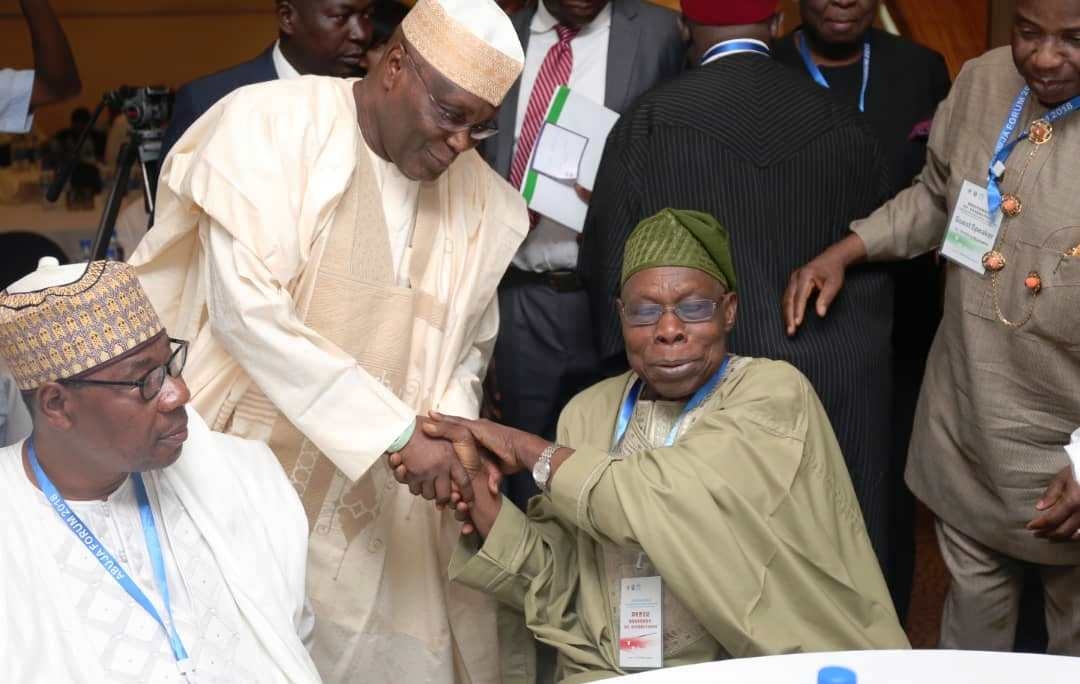Politics
I will continue from where Obasanjo stops – Atiku vows

- Atiku has vowed to continue his government from where Obasanjo stops
- He vowed to collaborate with the private sector to boost Nigeria’s economy
- Atiku said he would ensure that every geopolitical zone has a sense of belonging and is represented
Alhaji Atiku Abubakar, the Peoples Democratic Party’s (PDP) presidential candidate, pledged yesterday that if elected president the following year, he would reinstate the economic policies that had been put in place during the 1999–2007 administration of former President Olusegun Obasanjo, while he served as vice president.
He claimed he would specifically urge increased private sector investment to boost economic activity, encourage job creation, and focus on eradicating poverty.
In Lagos, the former vice president made the claims during a discussion with editors from the Nigerian Guild of Editors.
Atiku promised that his administration would closely collaborate with business leaders to address the nation’s infrastructure shortfall. He reiterated his support for resource management by well-equipped subnational units and expressed optimism for mending fences with fellow party members and the governor of Rivers State Nyesom Wike.
“The private sector is pivotal to my agenda to rejuvenate the economy and close our infrastructure deficit gaps. If I am elected president, I will work closely with the private sector by giving them incentives to create more jobs and also grant them tax holidays in order for them to intervene in our infrastructure development. Atiku stated.
“It is obvious to all that government doesn’t have all the money and the debt burden has continued to weigh us down. Therefore, the government has to be creative, and engaging the private sector is one way of solving our infrastructure problems in a sustainable way.”
If elected, the PDP contender claimed restructuring will be his first order of business as president. If elected, he reaffirmed his commitment to making sure that any required constitutional changes that would result in a transfer of more authority and resources to lower levels of government were put into effect on his first day in office.
Additionally, he promised to create a government of national unity.
According to Atiku, the country has become increasingly divided along sectarian, religious, and ethnic lines in recent years, and only a government of national unity can mend the wound.
In addition, Atiku said that the actions taken by the PDP government under the Obasanjo administration, when members of the Alliance for Democracy (AD) and All Peoples Party (APP) were included in the government after the PDP won the election in 1999, paved the way for peace and unity after a tense period.
“Even though PDP won overwhelmingly in 1999, we still included members of the opposition parties in a government of national unity and with that, we were able to ensure unity,” he said.
READ ALSO: If I couldn’t Islamize my own home, I won’t Islamize Nigeria -Tinubu
Atiku stated that if elected president, he would ensure that every geopolitical zone has a sense of belonging and is represented in the leadership of the security agencies. He said he would not act in the same way as President Muhammadu Buhari, who chose nearly all the heads of the security agencies from a section of the country.
In terms of the economy, he declared that he will maintain Obasanjo’s economic policies, particularly the privatization of failing public firms. Atiku emphasized the value of a private sector-driven economy, claiming that the most successful economies in the world are primarily driven by the private sector.
“Most successful economies allow the private sector to play its role and we saw prosperity during Obasanjo’s administration,” he said.
According to him, the government might offer such concessions to the private sector rather than borrow money to build roads and bridges, which would help generate the necessary jobs and prosperity.
When asked how he would do this, Atiku responded that he would make sure that more people were hired, that more equipment was bought, that more people were trained, and that more money was given to the security services.
The All Progressives Congress (APC) federal government currently in the office does not include as many women as the PDP did while it was in power. He also proclaimed his support for state police and made a commitment to include more women in governance.
According to him, the government might offer such concessions to the private sector rather than borrow money to build roads and bridges, which would help generate the necessary jobs and prosperity.
When asked how he would do this, Atiku responded that he would make sure that more people were hired, that more equipment was bought, that more people were trained, and that more money was given to the security services.
The All Progressives Congress (APC) federal government currently in the office does not include as many women as the PDP did while it was in power. He also proclaimed his support for state police and made a commitment to include more women in governance.
